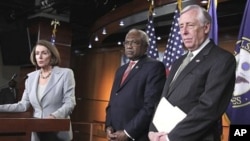The U.S. House of Representatives is immersed in a fourth day of debate on a bill that would cut government spending for this fiscal year by more than $60 billion. The epic battle between Democrats and Republicans is over the country’s spending priorities.
House lawmakers spent much of the past three days and nights debating and voting on 583 amendments to a bill to cut government spending. Some lawmakers began to appear tense and tired, but some, like Republican Representative Mike Pence of Indiana, were still passionate for even deeper cuts to government spending.
"We said to the American people that we would do at least a $100 billion, we have added hundreds of millions of dollars to that, let's do more, let's do 22 billion more, let's under-promise, over-deliver and set this nation back on a pathway toward fiscal responsibility and reform," he said.
Republicans swept midterm elections across the country last November, winning majority control of the House and picking up some seats in the still-Democratic controlled Senate. Many of the Republican candidates promised dramatic cuts to domestic spending.
During this week's marathon debate, Democrats have fought cuts to social programs, health care funding and funding for the Environmental Protection Agency and other regulatory agencies. Democratic Representative Keith Ellison of Minnesota said many Americans are probably wondering what the debate is all about.
"What it is all about Mr. Speaker is which direction will America go in? Will we cut back and scale back vital programs that help Americans do better and move into the middle class? Will we cut back and scale back vitally needed regulations to help protect us, allow us to have clean air and clean water and important other rights," Ellison said. "Or, Mr. Speaker, will we have an America where we have labor rights, where we can organize, where we can have adequate regulations that give us the opportunity to have a decent standard of life in America.”
Anna Palmer of "Congressional Quarterly" said Congress is having a hard time making budget cuts because it is more used to spending,
"For the first time in a very long time, the House of Representatives is looking at cutting funds instead of adding them, in terms of foreign aid, in terms of education and making really drastic cuts," she said.
The current temporary spending measure now in effect will expire on March 4. The House and the Senate have to agree on a spending bill to prevent a government shutdown on March 5. The U.S. government shut down in late 1994 after a showdown between then Democratic President Bill Clinton and a Republican-controlled House. Palmer said Republican leaders are wary of another shutdown.
"House Republicans have said publicly and very adamantly, frankly, that they do not want a government shutdown," she said. "They did that in 1994 and it was not a very successful political tool."
But Palmer and other analysts say the high-stakes battle over budget priorities is also risky for Democratic President Barack Obama. Democratic leaders in the Senate have said they will not accept such drastic cuts to a spending bill, and Obama has said he would veto it if it reaches his desk.
US Lawmakers Continue Marathon Debate on Government Spending
- By Cindy Saine












